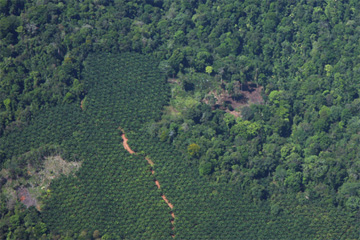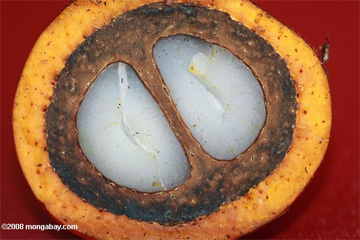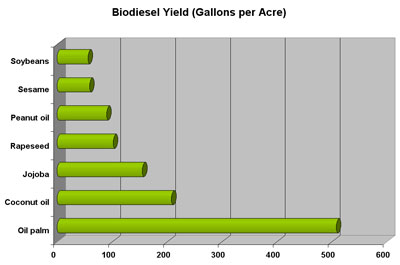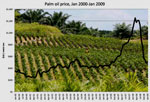|
|
Vale, the world’s largest miner of iron ore, has signed a $500 million joint venture with Biopalma da Amazonia to produce 160,000 metric tons of palm oil-based biodiesel per year, reports Reuters.
Vale says the deal will save $150 million in fuel costs starting in 2014, with palm oil biodiesel replacing up to 20 percent of diesel consumption in the company’s northern operations. The biodiesel will be produced from oil palm plantations in the Amazon state of Pará.
In a statement announcing the venture, Vale’s Director of Energy Vania Somavilla noted that “making biodiesel from palm oil is ten times more productive than making it from soy,” making it a significantly cheaper source of biofuel.
   As the world’s highest yielding mass market oilseed, palm oil will likely offer better financial returns than cattle ranching and mechanized soy farms, the dominant agricultural activities in Brazilian Amazon, and will employ larger numbers of people (oil palm plantations may employ roughly one worker per 8-10 ha, whereas a single cowboy can handle 4,000-5,000 head of cattle grazing hundreds to thousands of hectares of land). Therefore, provided technical and logistical hurdles can be overcome, oil palm is poised to become an important new form of land use in the Brazil Amazon. But limiting oil palm expansion to abandoned agricultural lands could offer producers a more effective way to sustainably meet growing demand for vegetable oils than with other oilseeds. Environmentalists are most concerned by palm oil production that comes at the cost of carbon-dense and biologically-rich rainforests and peatlands, rather than degraded croplands. |
The move is likely to stir up criticism from environmentalists that fear palm oil production could soon become a major driver of deforestation in the region. Cultivation of oil palm is a leading cause of forest loss across Southeast Asia, but has yet to be widely planted in the Brazilian Amazon, where deforestation is mostly driven directly by conversion for cattle pasture expansion and indirectly by expansion of industrial agriculture, including soy.
Pressure from green groups may have contributed to last month’s decision by Felda, Malaysia’s land development agency, to pull out of its joint venture with Braspalma to develop 100,000 hectares of oil palm plantations in the heart of the Amazon. The project would have been one of the largest in Brazil. Currently palm oil production is dominated by Agropalma, which accounts for roughly three-quarters of the market, followed by Dendê do Pará S/A (Denpasa), Marborges Agroindústria of Moju, Pará, and other small producers.
According to the U.S. Depart of Agriculture, Brazil presently produces roughly 110,000 tons of crude palm oil per year, but pending legislation would create new incentives for land owners to increase plantings. Brazilian lawmakers are weighing a law that would allow landowners to count plantations as forest towards their legal forest reserve requirement. By law landowners in the legal Amazon must retain 80 percent forest cover on their holdings.
The potential for palm oil plantations in the Brazilian Amazon is vast: scientists at the Woods Hole Research Center estimate that 2.283 million square kilometers (881,000 sq miles) of forest land in the region is suitable for oil palm, an area far greater in extent than that which could be converted for soy (390,000 sq km) and sugar cane (1.988 million sq km), the dominant biofuel feedstocks in Brazil.
In addition to the potential change in the legal reserve requirement, oil palm expansion in the Amazon will likely be facilitated by infrastructure projects currently underway in these region, including road-building, port expansion, and new hydroelectric projects.
Related articles
Did Malaysia cancel plans for palm oil development in the Amazon?
(05/21/2009) The Malaysian government’s federal land agency (FELDA) is now denying its well-documented plan to develop oil palm plantations in the Amazon rainforest, reports Ecological Internet, a forest advocacy group that carried out a campaign against the project.
Malaysian palm oil targets the Amazon
(03/25/2009) Malaysia’s Land Development Authority FELDA will soon break ground on a joint venture with a Brazilian firm to establish 30,000-100,000 hectares (75,000 – 250,000 acres) of oil palm plantations in the heart of the Amazon rainforest, reports the Malaysian Star.
Will palm oil drive deforestation in the Amazon?

(03/23/2009) Already a significant driver of tropical forest conversion across southeast Asia, oil palm expansion could emerge as threat to the Amazon rainforest due to a proposed change in Brazil’s forest law, new infrastructure, and the influence of foreign companies in the region, according to researchers writing in the open-access journal Tropical Conservation Science. William F. Laurance, a senior scientist at the Smithsonian Tropical Research Institute (STRI) in Panama City, Panama, and Rhett A. Butler, founder of environmental science web site Mongabay.com, warn that oil palm expansion in the Brazilian Amazon is likely to occur at the expense of natural forest as a result of a proposed revision to the forest code which requires land owners to retain 80 percent forest on lands in the Amazon. The new law would allow up to 30 percent of this reserve to consist of oil palm.
Malaysia targets Africa and the Amazon for oil palm expansion
(08/25/2008) Facing land scarcity at home and environmental complaints, Malaysian palm oil producers should look overseas to expand operations, a high-ranking Malaysian agricultural minister said Monday.
Brazil to establish oil palm plantations on degraded Amazon rainforest lands
(08/20/2008) Brazil will allow the establishment of oil palm plantations on degraded lands in the Amazon rainforest under a agreement signed between Brazil’s ministers of agriculture and the environment, reports Folha de S. Paulo.
Future threats to the Amazon rainforest
(07/31/2008) Between June 2000 and June 2008, more than 150,000 square kilometers of rainforest were cleared in the Brazilian Amazon. While deforestation rates have slowed since 2004, forest loss is expected to continue for the foreseeable future. This is a look at past, current and potential future drivers of deforestation in the Brazilian Amazon.
Palm oil industry moves into the Amazon rainforest
(07/09/2008) Malaysia’s Land Development Authority FELDA has announced plans to immediately establish 100,000 hectares (250,000) of oil palm plantations in the Brazilian Amazon. The agency will partner with Braspalma, a local company, to form Felda Global Ventures Brazil Sdn Bhd. FELDA will have a 70 percent stake in the venture. The announcement had been expected. Last month Najib said Malaysia would seek to expand its booming palm oil industry overseas. The country is facing land constraints at home.